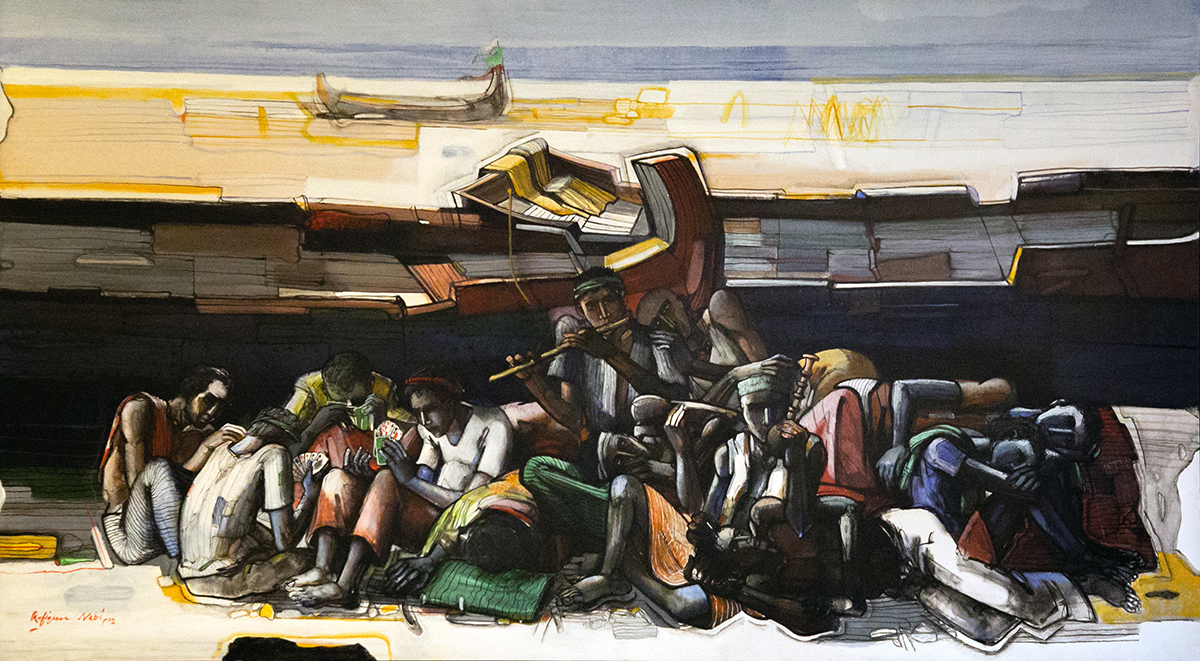Authentic Bangladeshi Cuisine
 Rafiqun Nabi, Fisherman at rest (2012)
Rafiqun Nabi, Fisherman at rest (2012)
There are few things that are good value for money in London. Bike repair at Whitechapel Bikes is one of them. Just to prove it, a crowd of couriers and their e-bikes extends out of the shop’s entrance. The storefront with a crowd of neon blue jackets looks more like a dystopian scifi scene than a bicycle mechanic’s shop in an Arab quarter.
I make my way through the narrow walkway. I guide my single-speed past an assemblage of mechanic and electronic spare parts, organized in a controlled state of chaos.
I show the mechanic the bend on my rear wheel. It’s a result of a careless car driver, breaking into me. Admittedly, I was cycling diagonally across the opposite road and onto the pavement.
“How soon do you need it?” the mechanic asks, “1-2 hours?”
“ASAP, to be honest,” I reply.
“Sure, come back in 20 mins! I’ll work on aligning your bike first thing.”
Man, I love this shop. I cross the street looking to grab lunch. The consistent mediocrity of Subway tempts me, but I opt-in for a run-down Bangladeshi place right next to it.
As the man behind the counter microwaves a tired vegetable curry, I count the food safety violations. I begin to doubt my choice of lunch but warm high-school memories from worse places in Himalayas make me stick to my choice. I find a free table and nibble at my meal. The lunch is below boarding school diner quality.
As I slowly make my way through the giant plate of rice, a homeless man enters the canteen. The socks on the man’s feet, drenched from the rain outside, leave wet marks on the floor. In the bedrock of human desperation, he doesn’t ask for change. The man makes his way directly to the trash can. He picks scraps of rice and paneer and begins to eat them. The canteen’s staff and visitors are humble people. Probably working below the living wage in an expensive city. Whitechapel is an area where surprises are to be expected. These people are Whitechapel locals. Yet every single one of them is left speechless. We’re shocked like a group of British tourists in Dhaka, who’ve just seen a starving child for the first time.
I look at the outrageously large portion in front of me. I’m sure I won’t finish half of it. But should I offer it to the homeless man less than one meter away from me? I’m not a fan of my lunch. But giving it up feels uncomfortable. I’m still feeling peckish.
The staff pack a rice biryani and give it to the starving man. I don’t just feel like a witness to a noble act. I feel that I’ve partaken in it myself. A sense of relief comes to me. My daily comforts have been restored. After all I’m already dining in a rundown Bangladeshi eatery. Surely that makes me an adventurous and open minded soul?
I leave my half-finished plate and cycle to WeWork on a newly repaired bicycle. I order a triple shot decaf oat cortado. It’s served to me by a barista who’s services are included in my membership. When I make my way up to the third floor, I’m pleasantly surprised by a startup fair. Well, I don’t give a fuck about the startup fair. It’s the table of cupcakes, chocolates, biscuits, and candy that capture my attention. I wrap two biscuits in a napkin and bring them to my desk. In front of an open journal, I take a sip of cortado, reflect on the absence of problems in my life, and type up this essay.
Thanks to Mihai Bujanca for reading a draft of this.